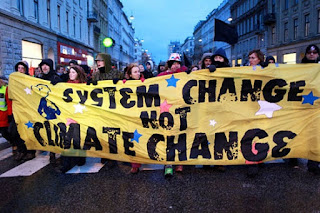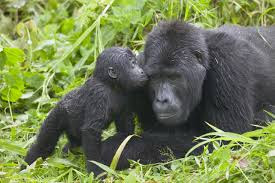Ecological degradation, exploding inequality and massive deregulation are contributing globally to deepening poverty, increasing authoritarianism, and a warming planet hurtling towards a devastating collapse of eco-systems on which our entire economy, health, welfare and way of life depends. With these issues threatening planet-wide chaos, a class analysis simply cannot be confined within the narrow boundaries of industrial class relations.
A traditional class analysis is drawn from the inherent conflicts between classes produced by the capitalist economic system, as a result of one class extracting wealth from another. A green class analysis finds no disagreement with this. It simply expands the analysis to acknowledge that this same class also extracts resources for its own control and denies it to others, unless in exchange for ever-greater profit.
 |
| Climate Justice Action Network |
A green class analysis instead must begin with relations of resource use and control, or socio-ecological relations; that is, the entitlement by which individuals, households, communities and countries possess or gain access to resources within a global economy, a global economy expertly structured against the overwhelming majority of citizens. It starts at the intersection of power, politics, culture and political economy that reflect these socio-ecological relations.
This could be referred to as the Nature-Society dialectic. The dialectic that underpins a green class analysis questions how these forces impact working class, POC, LGBT and marginalised communities, and those least able to defend themselves: from individuals and households, to towns, countries, regions and, ultimately, in the case of climate change, globally:
How can greater democracy improve the equity of resources distribution?
How should work be valued?
How can we prevent women and minority groups from being excluded from decision-making around resource access?
Who wins and who loses from privatised commons?
How is colonialism still shaping uneven access to resources and political power for non-western and non-white communities, in the UK and around the world? What can institutional reparations for the transatlantic slave trade, called for by the Green Party, look like?
How can Green solidarity with the global feminist and LGBT movements, peace movement, indigenous movements translate into practical action in the UK?
How, ultimately, can we stop a capitalist economic system that can only exist by demolishing our planet, by exploiting our labour, and by oppressing marginalised groups?
How, and with what, can we replace it?
These are some of the questions at the heart of green policy-making. The green analysis rests on a simple, fundamental belief: there is no environmental justice without social justice, without economic justice, or without racial justice and solidarity, here and around the world. While Labour was selling ‘Controls on immigration’ mugs in 2015, Greens were calling for new bank holiday to celebrate the contribution migrants make to the UK.Greens see the environment as the crucible of class struggle and conflict over access to resources and resource control; air pollution, for example, kills 40,000 people a year in the UK, with people from poorer communities disproportionally affected. Decades before any other party, the Greens recognised and campaigned on clean air as a social justice issue; not just the need for clean air in general, but more importantly on the inherent injustice of wealthier people having access to the clean air working class people are deprived of.
Longstanding policies like the 4 day working week, universal basic income, the Green New Deal (which the UK Green Party helped create in 2009), a wealth tax, free university tuition, and free school meals are radical policies that have a number of consequences: improving the lives of millions of people and helping to decrease levels of the UK’s carbon emissions; allowing people a better work/life balance; ending the fear of hunger and homelessness; creating tens of thousands of well-paid jobs in the green sector; decreasing fuel poverty through free insulation schemes; ending child food poverty, ensuring that all schoolchildren receive at least one healthy, free meal a day (with the increase in attainment rates that follows).
If the Green Party can be seen as the political expression of the environmental movement, then it should also be at the forefront of standing in solidarity with the union movement. Democratic industrial and trade union policies need to set out how a fully unionised, democratised industrial policy can re-orient the political economy away from one of simple capital accumulation, and aimed towards a democratically-controlled industrial and energy sector. This, if nothing else, is absolutely critical in tackling the climate crisis.Green policy to strengthen trade unions goes further than that of the Labour Party, because it also recognises that strong trade unions, woven into every industrial sector from boardroom to workplace, is critical for organised working class mobilisation. This will be crucial in ensuring that the already-locked-in effects of climate change are distributed equitably, as those effects will be suffered worse by those least able to escape or adapt.
Policies like some of these, made by Green Party members, with no influence from industrial or political lobbyists, also act as transitional demands on capitalism, calling for structural changes that place a strain on capitalism’s capacity to exploit people and nature, and agitates towards the goal of a more equal, democratic society.
The central difference between a traditional class analysis, that foregrounds employment and working conditions, and a green analysis, is that the latter expands and builds on industrial relations to include these relations of resource production.
The best example of this divergence could be found on the issue of fracking. Fracking is a dangerous and unnecessary energy process, the last vicious gasp of the dying fossil fuel industry. It devastates local eco-systems, rendering land infertile and water polluted, making tap water unsafe to drink and farms unable to grow crops. This has the knock-on effect of a loss of employment and business in the local area, which then sees population displacement as those who can afford to move away.
Fracking sites are nearly always built in areas where poor or marginalised people live; those most unable to fight back. Greens see fracking not just as a pollution issue but, like access to clean air, an issue of social justice. While a traditional labour analysis saw Labour MPs in 2015, under pressure from unions whose members are drawn from the fracking industry, largely abstain on a vote to ban this incredibly polluting industry, Green politicians were being arrested at community-led anti-fracking demonstrations.
A green analysis is based on four pillars of ecological action, social justice, grassroots democracy and nonviolence, reflected in a commitment to a just transition not only away from fossil fuels, but also from the UK’s arms and nuclear weapons industry. A just transition based on these four pillars focuses on providing ‘green-collar’ training and jobs in green energy and sustainable industries, which puts workers and livelihoods at the centre of the change.
The Earth is spiralling towards an ecological collapse, and with it an economic system on which a traditionally-defined analysis of class relations is constructed. But questioning the unequal power relations in the ownership of the planet’s resources, and therefore who controls not just the means of production but also the social relations of production – who suffers from resource control, and at whose hands - will be the central defining issue of the decades to come.There is still so much more to be done, and we will get a lot wrong along the way. But building these issues into a robust class analysis, and placing class issues at the heart of policy-making for an uncertain future, makes the green analysis, for now, the only one fit for the 21st Century.
















